Hello and welcome to H1, a newsletter named after our new hospital bus route,which is designed to make sure that you and your colleagues are kept up to date with the latest news and activities at Epsom and St Helier.
|
A welcome from Chief Executive Daniel Elkeles
|
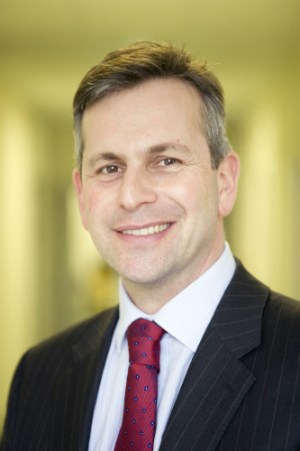
This month we held our Annual Public Meeting which was an opportunity to share the highlights and challenges of the last financial year, as well as take questions from members of the public.
This is also the meeting at which we are required to publish our
annual report and accounts
. It is a bit of a long read, but we have tried to fit in as many photos from the year as we could, and it is remarkable to see just what we have all achieved together over the past 12 months. We have published our slides from the meeting on our
website
too which provide a snapshot of the work our amazing staff have done over the year.
|
Improving Healthcare Together
|

As we are sending out this Partnership Update, I was delighted to see that the Improving Healthcare Together programme has now submitted the updated draft Pre-Consultation Business Case (PCBC) to NHS England for the next stage of the national assurance process. This is a significant step in the process to confirm our long term future.
The proposals detailed in the draft PCBC are focused on keeping hospital services within the combined geography of the three clinical commissioning groups (CCGs). The proposed new model, developed by experienced GPs and clinicians from the hospitals, will mean that the vast majority of patients (85%) would see no change to the hospital location where they receive their care. This will mean that Epsom Hospital and St Helier Hospital will continue to run the majority of services as they do now. For the sickest and most at-risk patients, representing 15% of the people who use the hospitals' services, the proposal is to consolidate acute services onto a single site in a new purpose built facility. This new facility would deliver: the majors element of A&E, acute medicine, critical care, emergency surgery, hospital births and inpatient paediatrics.
Based on the non-financial and financial evidence to date, the updated draft PCBC contains a provisional ranking of the three options of where to locate the new acute facility, to enable regulators to assess the proposals and make a decision in principle on capital.
As it may be many months before the assurance and capital decision making process is complete, the IHT Programme has produced and published a stakeholder briefing document (which can be viewed here). It is really important to state that this is not a consultation document. It has been produced to bring everyone up to speed on where the programme is and with the current thinking.
Following feedback from the national assurance process, and an agreement in principle that capital funding will be available, the three CCGs will meet in public to consider all of the evidence and decide on a preferred option. This will trigger a formal public consultation on all options including the preferred option.
|
|
All Systems Go - Make Epsom Flow
|
|
An All Systems Go week at Epsom (
an extraordinary week of focus to reduce our patients' length of stay across Epsom Hospital) has been an astounding success. The week of the 8 July was an incredibly busy one - Monday was our busiest day ever, as 618 people came to A&E. By the end of Sunday, we saw one of our busiest weeks for activity on record, which only makes the achievements of All Systems Go - Make Epsom Flow even more remarkable! Despite that pressure, our teams from the wards, social care, pharmacy, community services, porters and facilities, diagnostics and therapies all pulled together to identify the hurdles that prevent us from discharging patients from hospital when they are ready to leave. And it worked! We saw consistently high numbers of discharges (up to 29 in one day).

In the week we
discharged 140 patients who were all medically well and ready to go home, which is about 30 more than we would see in a usual week, and importantly, not one of those patients has had to come back and be re-admitted to hospital (this is correct at the time of writing, but as always we will continue to measure this to make sure).
The teams re
duced the numbers of patients who had stayed in our hospitals for more than 60 days from 15 to six, and the number of patients who had stayed with us for more than 21 days reduced from 49 to 39. These are some significant improvements, and f
ollowing on from this success, we will be running an All Systems Go at St Helier Hospital in August.
|
Our junior doctors shine in merit awards
|
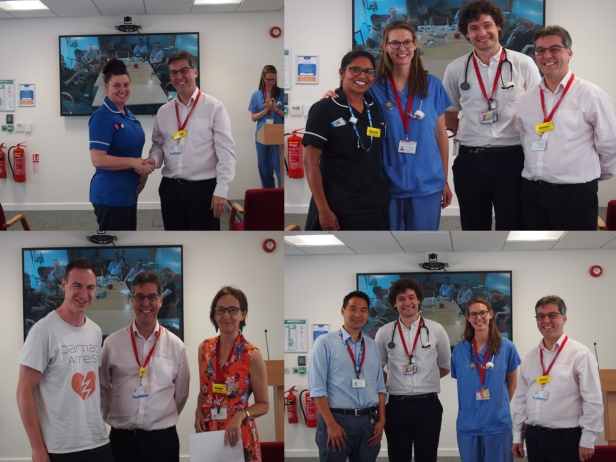 July marked the end of the academic year for our students, and what better way to kick off the holiday season than to host our annual merit awards for our junior doctors. July marked the end of the academic year for our students, and what better way to kick off the holiday season than to host our annual merit awards for our junior doctors.
Our junior doctors work phenomenally hard and make a very real difference to our patients and the way our hospitals work, and the awards are greatly deserved.
|
|
Finalists at the prestigious HSJ Awards 2019
|
The Elena Power Centre for Human Factors and Simulation Team were finalists in the 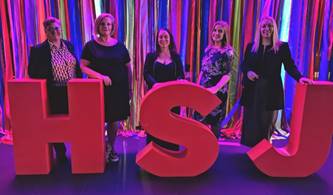 HSJ Patient Safety Education and Training Award for 'Inter-Professional Trust-Wide Embedding of Human Factors', out of hundreds of entries for the prestigious HSJ Patient Safety Awards 2019. HSJ Patient Safety Education and Training Award for 'Inter-Professional Trust-Wide Embedding of Human Factors', out of hundreds of entries for the prestigious HSJ Patient Safety Awards 2019.
The Centre has been recognised for their exceptional work in incorporating Human Factors across all their simulation-based education, developing standalone Human Factors courses and ensuring Human Factors are considered within serious incident analysis.
|
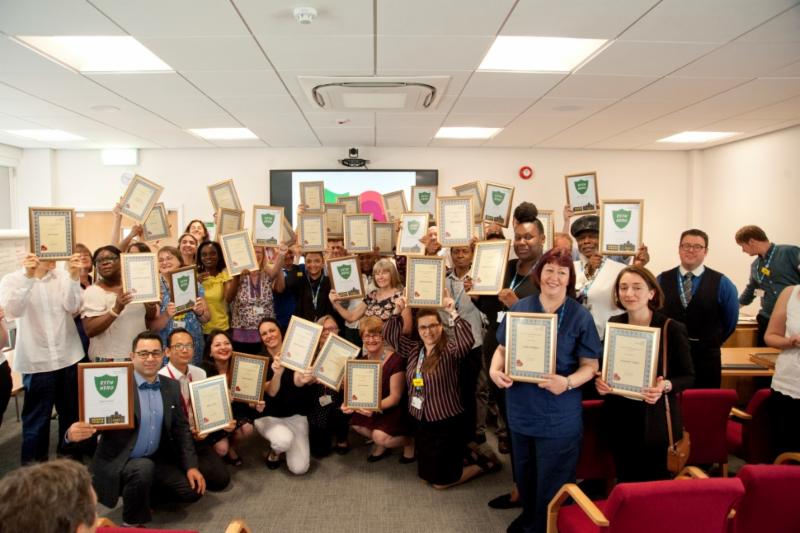 This month a huge number of our staff were nominated by patients and visitors to receive a Patient First Gold Badge Awa
rd, and lots of staff nominating their colleagues for going above and beyond to receive a Heroes Award. This month a huge number of our staff were nominated by patients and visitors to receive a Patient First Gold Badge Awa
rd, and lots of staff nominating their colleagues for going above and beyond to receive a Heroes Award.
Our Patient Experience T
eam reported 523 of our staff were thanked by name a staggering 958 times in the Friends and Family feedback during May, including 37 from Sutton and Surrey Downs Health and Care.
|
|
This month our cancer services team received their ESTH Hero badge and certificates in recognition for all their hard work in exceeding the cancer waiting time standards and ensuring our patients are seen in a timely way.
Over the course of the last financial year, we achieved all of the cancer waiting time standards - that is seeing patients with suspected cancer within two weeks of referral, providing first treatment within 31 days after diagnosis and ensuring that patients receive treatment within 62 days from the moment they are referred to us by a GP.
|
Mayor of Sutton declares Nuclear Medicine Unit officially open
|
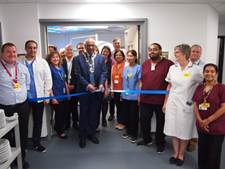 In July we welcomed the Mayor of Sutton, Cllr
Muhammmed Sadiq, who joined us to cut the ribbon at the official opening of our newly refurbished Nuclear Medicine Unit at St Helier. In July we welcomed the Mayor of Sutton, Cllr
Muhammmed Sadiq, who joined us to cut the ribbon at the official opening of our newly refurbished Nuclear Medicine Unit at St Helier.
The Unit has undergone a complete transformation, increasing its size and freshening up the atmosphere. As well as improving the environment, the £500,000 unit is home to a new cardiac stress test machine from the USA, meaning patients no longer need to travel to the Royal Brompton to receive this important diagnostic test.
|
|
A welcome shelter for Woodcote
|
In this month we also opened our newly refurbished triage room in the delivery suite 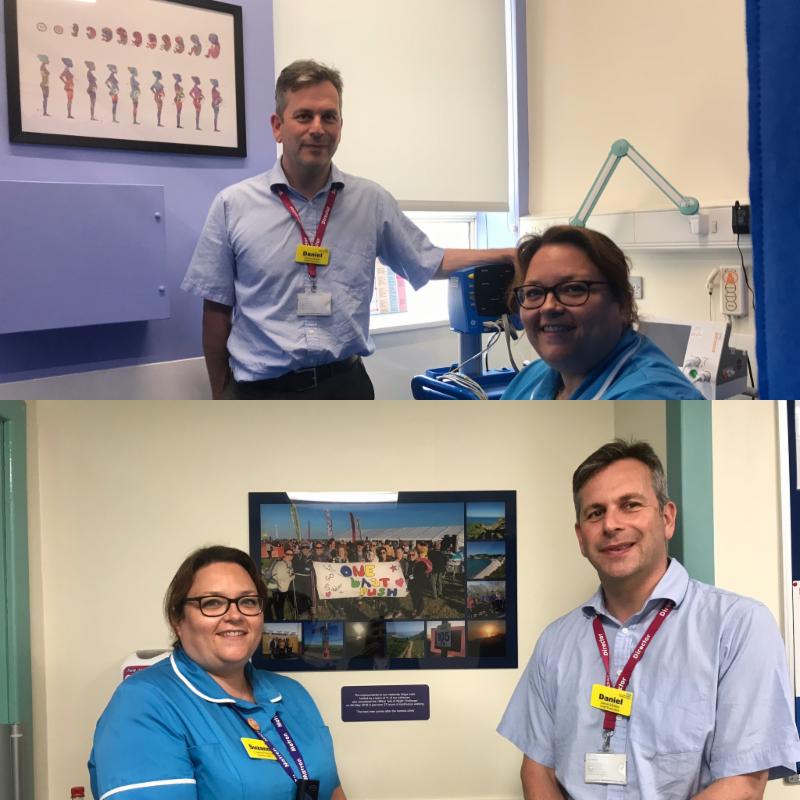 at St Helier, which was all made possible by the fundraising efforts of maternity staff who walked a 67 mile route around the Isle of Wight. at St Helier, which was all made possible by the fundraising efforts of maternity staff who walked a 67 mile route around the Isle of Wight.
The new room boasts new monitoring equipment, new mobile couches, new art work and new bay areas. The triage room is often the first stop for mums-to-be in the delivery suite, and so it is important that we make the right impression. We can certainly do that now, after the team raised £12,000 with the Isle of Wight Challenge and have invested it in refurbishing this vital room.
|
|
July saw the National Institute for Health Research (NIHR) 2018-19 Activity League Table published by the NIHR Clinical Research Network (CRN). It details the amount of NIHR CRN research activity taking place in all NHS trusts across England. The table provides a picture of how much clinical research is happening, where, in what types of trusts, and involving how many patients.
We all know that individual patients have better outcomes if they participate in research studies, and that hospitals with high participation in research studies have lower mortality. Our Research and Development (R&D) team is to be congratulated as we have made good strides in increasing the number of studies taking place by 28% (to 64) and the number of patients taking part by 78% (to 1,816) in 2018/19 compared to the previous year (the full results can be seen
here
).
|
|
Davis Unit is transformed
|
Earlier this month we opened the Davis Unit - our new outpatient unit at the back of Ferguson House at St Helier. The new unit is predominantly for elective orthopaedic outpatient appointments, but it also houses orthotics with a workshop where our experts can make adjustments to insoles, splints and braces, and is occasionally home to respiratory and cardiology clinics.
|
Our new £2 million fleet arrives!
|
|
The first batch of our new ambulances have arrived, replacing the old stock of ambulances which were plagued by regular break downs.
These new vehicles have bespoke fittings with a number of additional touches to keep our patients (and staff) safe and more comfortable than ever before. For example, we think we might be the first patient transport service in the country to have seatbelt alarms on all seats, giving staff a visual and audible notification that a person does not have a seatbelt on. They also have CCTV both inside and outside the vehicles and dashcams, and a new type of extending step that is easier to operate and less likely to break. And of course, being brand new, they are clean, comfortable and reliable.
|
Our new £2 million fleet arrives!
|
What an absolute scorcher last week was, as temperatures reached a high of 37C on Thursday. Conditions on our wards, in our diagnostic areas and in some offices have been very challenging and it has been difficult to keep our patients and staff cool and comfortable. Our old hospital buildings just are not equipped to deal with adverse weather and even as we refurbish and improve clinical areas, it is not always possible to build in air conditioning units. That said, we took delivery of 60 mobile air conditioning units that are now up and running in our most badly impacted areas and we relaxed some of the terms of the dress code to keep staff cooler. 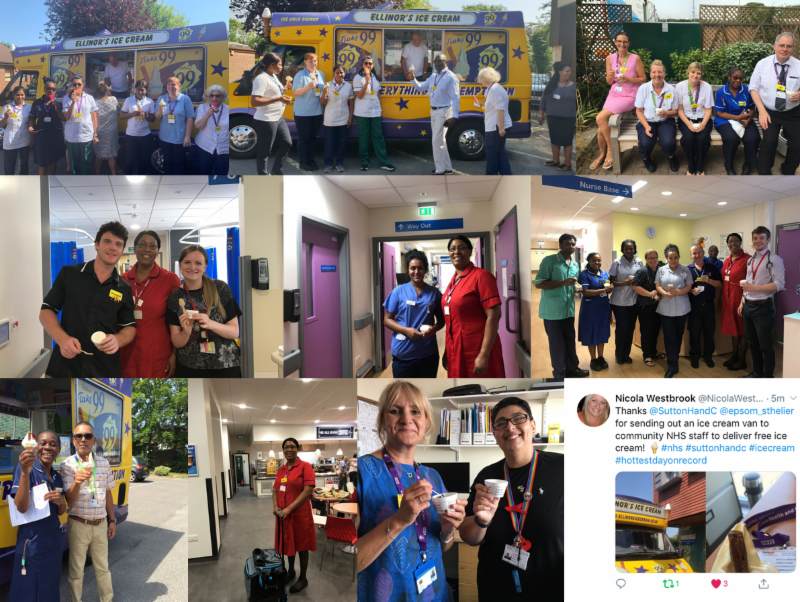
|
|
|
|
|
Copyright © 2017. All Rights Reserved.
|
|
|
|